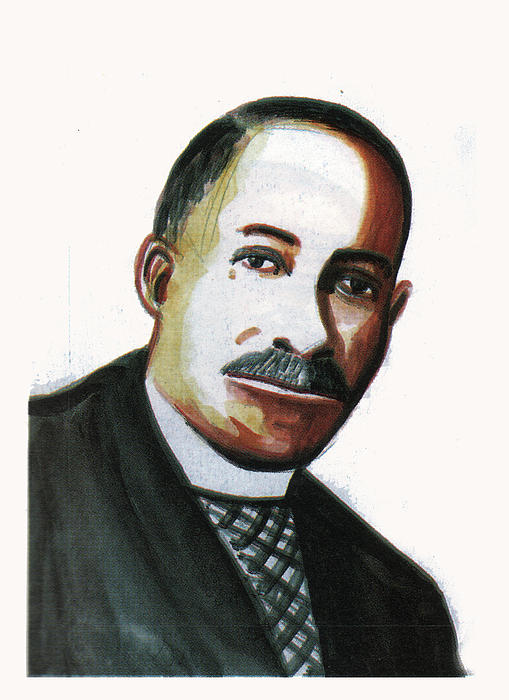"I have learned over the years that when one's mind is made up, this diminshes fear." -Rosa Parks
Unfortunately I could find no quotes by Dr. Daniel Hale Williams, perhaps because of the time in which he lived, perhaps because he was a black man in the mid-19th century doing something extraordinary and anything he said was not seen as being worth written down, but whatever the reason, I have no quotes to share from him. And yet, I feel as though Mrs. Parks's quote so beautifully describes what Dr. Hale Williams accomplished in his life that I knew it was the perfect thing to share and start off this post about his inspirational life.
Perhaps it is because of my family's genetic predisposition to health problems, but whatever the reason at a young age I found myself studying and fascinated with Dr. Hale Williams (often referred to as just Dr. Daniel Hale). He transcended the restrictions that society placed on him, scoffed at those who told him he couldn't do something just because he was black and refused to let anyone make him feel inferior just because of the color of his skin.
Join with me in honoring Dr. Daniel Hale Williams.
****
 After the elder Williams died, a 10-year-old Daniel was sent to live in Baltimore, Maryland, with family friends. He became a shoemaker’s apprentice but disliked the work and decided to return to his family, who had moved to Illinois. Like his father, he took up barbering, but ultimately decided he wanted to pursue his education. He worked as an apprentice with Dr. Henry Palmer, a highly accomplished surgeon, and then completed further training at Chicago Medical College.
After the elder Williams died, a 10-year-old Daniel was sent to live in Baltimore, Maryland, with family friends. He became a shoemaker’s apprentice but disliked the work and decided to return to his family, who had moved to Illinois. Like his father, he took up barbering, but ultimately decided he wanted to pursue his education. He worked as an apprentice with Dr. Henry Palmer, a highly accomplished surgeon, and then completed further training at Chicago Medical College.Opens the First Interracial Hospital
Williams set up his own practice in Chicago’s Southside and taught anatomy at his alma mater, also becoming the first African-American physician to work for the city’s street railway system. Williams—who was called Dr. Dan by patients—also adopted sterilization procedures for his office informed by the recent findings on germ transmission and prevention from Louis Pasteur and Joseph Lister.
Due to the discrimination of the day, African-American citizens were still barred from being admitted to hospitals and black doctors were refused staff positions. Firmly believing this needed to change, in May 1891, Williams opened Provident Hospital and Training School for Nurses, the nation’s first hospital with a nursing and intern program that had a racially integrated staff. The facility, where Williams worked as a surgeon, was publicly championed by famed abolitionist and writer Frederick Douglass.
"The battles that count aren't the ones for gold medals. The struggles within yourself--the invisible, inevitable battles inside all of us--that's where it's at."
-Jesse Owens
Completes First Open-Heart Surgery
 In 1893, Williams continued to make history when he operated on James Cornish, a man with a severe stab wound to his chest who was brought to Provident. Without the benefits of a blood transfusion or modern surgical procedures, Williams successfully sutured Cornish’s pericardium (the membranous sac enclosing the heart), becoming the first person to perform open-heart surgery. Cornish lived for many years after the operation.
In 1893, Williams continued to make history when he operated on James Cornish, a man with a severe stab wound to his chest who was brought to Provident. Without the benefits of a blood transfusion or modern surgical procedures, Williams successfully sutured Cornish’s pericardium (the membranous sac enclosing the heart), becoming the first person to perform open-heart surgery. Cornish lived for many years after the operation.In 1894, Williams moved to Washington, D.C., where he was appointed the chief surgeon of the Freedmen’s Hospital, which provided care for formerly enslaved African Americans. The facility had fallen into deep neglect and had a high mortality rate. Williams worked diligently on revitalization, improving surgical procedures, increasing institutional specialization, allowing public viewing of surgeries, launching ambulance services and adding a multiracial staff, continuing to provide opportunities for black physicians and nursing students. And in 1895, he co-founded the National Medical Association, a professional organization for black medical practitioners, as an alternative to the American Medical Association, which didn’t allow African-American membership.
Marriage and Later Career
Williams left Freedmen’s Hospital in 1898. He married Alice Johnson, and the newlyweds moved to Chicago, where Williams returned to his work at Provident. Soon after the turn of the century, he worked at Cook County Hospital and later at St. Luke’s, a large medical institution with ample resources.
Beginning in 1899, Williams also made annual trips to Nashville, Tennessee, where he was a voluntary visiting clinical professor at Meharry Medical College for more than two decades. He became a charter member of the American College of Surgeons in 1913.
"Success is to be measured not so much by the position that one has reached in life as by the obstacles which he has overcome while trying to succeed."
-Booker T. Washington
Death and Legacy
 Daniel Hale Williams experienced a debilitating stroke in 1926 and died five years later, on August 4, 1931, in Idlewild, Michigan.
Daniel Hale Williams experienced a debilitating stroke in 1926 and died five years later, on August 4, 1931, in Idlewild, Michigan.Today, Williams's work as a pioneering physician and advocate for an African-American presence in medicine continues to be honored by educational institutions worldwide.
(*Daniel Hale Williams. (2014). The Biography Channel website. Retrieved 07:49, Feb 10, 2014, from http://www.biography.com/people/daniel-hale-williams-9532269.*)


No comments:
Post a Comment
Want to pet The Vic?